Pellets Versus Seeds for Your Parrot:
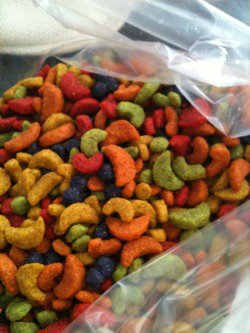
Many people have differing opinions on how a pet parrot should be fed. With so many choices of seeds and pellets, it may leave you wondering just what is right for your bird. Of course, you will want to make sure your bird is fed properly to be healthy and happy. However, if you are a new pet owner, then you may be wondering what is right.
The first thing that you need to remember is that your parrot needs a rounded diet that includes fruits and grains. However, there should be a base diet that makes up most of your parrot’s meals. This base should be either pellets or seeds, and there is a debate over which of these is right for the birds. Many people balk at pellets simply because they do not seem as natural as seeds. However, there have been plenty of experts that indicate that pellets are designed for bird nutrition and therefore contain more of the nutrients your parrot will need.
Which is Better for Your Parrot?
Your question is most likely which should you choose? Would pellets or seeds be right for your parrot? Here are a few facts about the two that will help you decide.
Seeds may seem more wholesome, but they are actually low in some of the most essential minerals and vitamins that the bird will need. You will have to make up for this through other dietary items. This will mean more additions to the diet and more work to keep it healthy. However, pellets are especially designed to include all of the nutrients that a bird will need so you do not have to add the other items.
Another thing you should know is that parrots generally just do not eat very many seeds when they are in the wild. They may eat a seed here and there, but it will certainly not be the main part of their diet. They will actually eat a large variety of fruits and vegetables. Because you cannot get the same fruits and vegetables here, you have to make a decision that will provide the best nutrition for your parrot through food items that can be found here.
Seeds are Bad for the Picky Parrot:
Everyone knows that a parrot can be quite picky when it comes to what it will and will not eat. If you provide your bird with a seed mix, everything it needs to be healthy may be in that mix. However, it may not eat all of those seeds. Your parrot may be picking around important seeds, and therefore, it may not be getting the well rounded diet that it needs
Which is better for your parrot, seeds or pellets? Ultimately, it will be up to you. You could provide your bird with all natural seeds, but you will need to make sure its diet is supplemented properly. You can choose manmade pellets that are designed to provide the right nutrition. Choose the one that you feel the most comfortable with.
The first thing that you need to remember is that your parrot needs a rounded diet that includes fruits and grains. However, there should be a base diet that makes up most of your parrot’s meals. This base should be either pellets or seeds, and there is a debate over which of these is right for the birds. Many people balk at pellets simply because they do not seem as natural as seeds. However, there have been plenty of experts that indicate that pellets are designed for bird nutrition and therefore contain more of the nutrients your parrot will need.
Which is Better for Your Parrot?
Your question is most likely which should you choose? Would pellets or seeds be right for your parrot? Here are a few facts about the two that will help you decide.
Seeds may seem more wholesome, but they are actually low in some of the most essential minerals and vitamins that the bird will need. You will have to make up for this through other dietary items. This will mean more additions to the diet and more work to keep it healthy. However, pellets are especially designed to include all of the nutrients that a bird will need so you do not have to add the other items.
Another thing you should know is that parrots generally just do not eat very many seeds when they are in the wild. They may eat a seed here and there, but it will certainly not be the main part of their diet. They will actually eat a large variety of fruits and vegetables. Because you cannot get the same fruits and vegetables here, you have to make a decision that will provide the best nutrition for your parrot through food items that can be found here.
Seeds are Bad for the Picky Parrot:
Everyone knows that a parrot can be quite picky when it comes to what it will and will not eat. If you provide your bird with a seed mix, everything it needs to be healthy may be in that mix. However, it may not eat all of those seeds. Your parrot may be picking around important seeds, and therefore, it may not be getting the well rounded diet that it needs
Which is better for your parrot, seeds or pellets? Ultimately, it will be up to you. You could provide your bird with all natural seeds, but you will need to make sure its diet is supplemented properly. You can choose manmade pellets that are designed to provide the right nutrition. Choose the one that you feel the most comfortable with.
The Importance of Clean Water
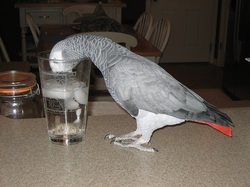
All birds must be offered a constant supply of fresh, clean drinking water. It is simply a bird trait to soil the water dish, and you will just have to get used to changing it many times every day. If at all possible, it is probably healthiest to provide your parrot with bottled non-carbonated mineral water. If you must use tap water for your bird you should bring it to a rapid boil first and allow it to cool before placing it in the container. This will help destroy potentially toxic bacteria that grow in the water as it sits in the house pipes and also boils out many of the chemicals added at the water treatment plant. Although we humans are able to tolerate many of these substances, our body mass is substantially larger and our significantly smaller avian friends are not as adept.
DIET
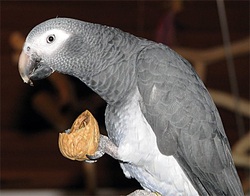
There are lots of good things to feed your parrot, but there are a few things that you might offer that can kill your beloved feathered friend. The reasons may differ but the results are the same: death.
Foods You Must NEVER Feed Your Parrot
There are only a few things that can actually kill your parrot as far as human food goes. These are:
As you can see, this is a very short list.
Foods You Should Limit
This list is a lot longer and contains people foods that won't kill your parrot quickly. However, over time, these foods will be detrimental to its health. These foods fall into three main categories. Some foods may fall in to several or even all of these categories:
Foods High In Fat
Any food that has a high fat content should be limited. In the wild, parrots eat very little fat; what they do eat is mainly from bugs and other protein sources. Now, this doesn't mean that you parrot pal can't have a taste of these foods occasionally. Think of feeding your parrot as if you were feeding a three year old child. You would let a child have a few potato chips even though they are high in fat and salt, but you would limit the quantity. With a parrot, of course, the portions are much, much smaller. If you want to let your parrot have a bite or two of a single potato chip once in a while, there is nothing wrong with this limited quantity. Just do not let it become a habit that every single day the parrot gets potato chips and don't let the quantity increase over time. Everything in moderation is the practice to be followed for this list.
Examples of these foods are:
Foods High In Salt
Too much salt isn't good for people or birds. Of course, since parrots are so much smaller, a little bit goes a long way. Some foods can simply be taken out of the food preparation cycle before salt is added to allow the parrot to enjoy a safe serving. If your parrot enjoys cooked veggies and you salt your food, then by all means take some out before adding salt. Crackers can have the salt scraped off before allowing the parrot to have the food. Many foods can be found in unsalted versions that can safely be shared with you parrot. For example, unsalted nuts are fine but eating a lot of salted nuts is not good for your feathered kid.
Some of the foods in this category are:
Foods High in Sugar
Parrots can become little junk food junkies is allowed. They seem to love sweets and will insist on having a taste. Most foods with sugar are perfectly safe to allow the parrot to have a bite or even two, but limit the quantities to a very small amount and do not allow these foods every day. These are for the rare occasion rather than daily diet.
Examples of these foods include:
Everything else that you eat, you can and should share with your parrot. The more different foods your bird eats, the better its health will be, the more vibrant the feather colors and the happier you'll be. However, use some common sense about feeding people food to parrots.
Fruits and vegetables are very good additions to the diet, preferably raw but if you parrot prefers some things cooked, that is better than not eating the food at all. Eggs, cheese, pasta, rice, potatoes (other than potato chips or French fries), pizza, noodles, bits of meat or fish and other people foods are great for you parrot. Limit the amount of meat to very small amounts because in the wild, parrots do not get a lot of meat-type protein. Some parrots LOVE a bone with bits of meat left on it to chew on and will even eat the marrow out of the bone.
Of course, fruits and vegetables are the best for the parrots and for us. But variety is the spice of life and everyone wants variety including your parrot.
Foods You Must NEVER Feed Your Parrot
There are only a few things that can actually kill your parrot as far as human food goes. These are:
- * Avocado
- * Chocolate
- * Alcohol
- * Seeds of any fruit
- * Raw meat
- * Uncooked eggs
- * Any food that may have mold or may have spoiled (including seeds)
As you can see, this is a very short list.
Foods You Should Limit
This list is a lot longer and contains people foods that won't kill your parrot quickly. However, over time, these foods will be detrimental to its health. These foods fall into three main categories. Some foods may fall in to several or even all of these categories:
Foods High In Fat
Any food that has a high fat content should be limited. In the wild, parrots eat very little fat; what they do eat is mainly from bugs and other protein sources. Now, this doesn't mean that you parrot pal can't have a taste of these foods occasionally. Think of feeding your parrot as if you were feeding a three year old child. You would let a child have a few potato chips even though they are high in fat and salt, but you would limit the quantity. With a parrot, of course, the portions are much, much smaller. If you want to let your parrot have a bite or two of a single potato chip once in a while, there is nothing wrong with this limited quantity. Just do not let it become a habit that every single day the parrot gets potato chips and don't let the quantity increase over time. Everything in moderation is the practice to be followed for this list.
Examples of these foods are:
- * Potato chips
- * Vegetables with lots of butter
- * Fried foods
- * Cream, whipped or liquid
- * Cake icing
- * Ice cream
- * Fatty meat
- * Butter sauces and cream soups that contain a lot of butter
Foods High In Salt
Too much salt isn't good for people or birds. Of course, since parrots are so much smaller, a little bit goes a long way. Some foods can simply be taken out of the food preparation cycle before salt is added to allow the parrot to enjoy a safe serving. If your parrot enjoys cooked veggies and you salt your food, then by all means take some out before adding salt. Crackers can have the salt scraped off before allowing the parrot to have the food. Many foods can be found in unsalted versions that can safely be shared with you parrot. For example, unsalted nuts are fine but eating a lot of salted nuts is not good for your feathered kid.
Some of the foods in this category are:
- * Salted potato chips
- * Salted corn chips
- * Salted nuts
- * Salted vegetables or meats
- * Many prepared foods such as microwave entrees
- * Salted popcorn
- * Bacon, ham and other cured meats
Foods High in Sugar
Parrots can become little junk food junkies is allowed. They seem to love sweets and will insist on having a taste. Most foods with sugar are perfectly safe to allow the parrot to have a bite or even two, but limit the quantities to a very small amount and do not allow these foods every day. These are for the rare occasion rather than daily diet.
Examples of these foods include:
- * Cakes
- * Cookies
- * Candy
- * Sweetened juices
- * Other sweetened drinks
- * Sugary cereal
- * Ice cream
Everything else that you eat, you can and should share with your parrot. The more different foods your bird eats, the better its health will be, the more vibrant the feather colors and the happier you'll be. However, use some common sense about feeding people food to parrots.
Fruits and vegetables are very good additions to the diet, preferably raw but if you parrot prefers some things cooked, that is better than not eating the food at all. Eggs, cheese, pasta, rice, potatoes (other than potato chips or French fries), pizza, noodles, bits of meat or fish and other people foods are great for you parrot. Limit the amount of meat to very small amounts because in the wild, parrots do not get a lot of meat-type protein. Some parrots LOVE a bone with bits of meat left on it to chew on and will even eat the marrow out of the bone.
Of course, fruits and vegetables are the best for the parrots and for us. But variety is the spice of life and everyone wants variety including your parrot.
Important Parrot Diet Facts
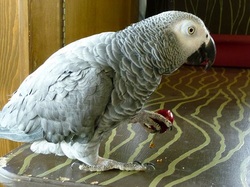
Taking care of your parrot will greatly depend on diet and nutrition. Choosing the right foods for your bird will have a big effect on the bird’s overall health. It can be very easy to accidentally underfeed or overfeed the parrot. Additionally, your parrot could be experiencing deficiencies that you may not even realize. You must take the time to learn about what your parrot needs to stay healthy and then make the best diet and nutrition decisions. Here you will find 7 important facts to remember when it comes to diet for your pet parrot.
Things to Know About Your Parrot’s Diet:
1. Never change your bird’s diet unless the parrot is already quite healthy. A dietary change can be hard on a bird’s system. If the bird is ill or malnourished, it could become even more ill when the diet is changed.
2. Pellets can make a good starting point for any parrot’s diet, but pellets cannot be the whole diet. Instead, think of them as a base, as you might eat rice. You will also need to add in vegetables, fruits, cheeses, nuts and other foods that can provide a well-rounded diet for your bird.
3. A parrot cannot go for very long without water. Because of the way their body uses liquids, a parrot can become dehydrated within hours and then could die in just a few days. It is vital that you provide your parrot with a constant supply of fresh water.
4. Birds can be more than a little picky. If you have been a long time parrot owner, that previous statement may have made you laugh simply because you know just how true it is. For example, presentation can make a big impact on whether or not your parrot will eat the food. For example, your bird may love corn kernels but may greatly dislike corn cut off of a cob. You will need to take a trial and error approach to choosing the shape and form of the bird’s food.
5. Too much or too little vitamin A can be toxic for your parrot. Many people think that there is no such thing as a vitamin overload. However, your parrot could become too ill if it ingests too many vitamin A rich foods.
6. Parrots are always lactose intolerant. Their bodies are not capable of digesting milk or any lactose product. In great quantities, lactose can be fatal for your parrot. Small amounts could simply make the bird ill. It is best to avoid all lactose in your bird’s diet.
7. There are many human foods that are highly toxic to parrots. While you can safely feed your bird various table scraps, there are many that you cannot. These foods include onions, avocadoes, caffeinated beverages, and chocolate.
You can easily make sure that your parrot is receiving proper nutrition if you take the time to choose your bird’s meals very carefully. Remember that your parrot’s dietary needs are not the same as yours, and you cannot assume that whatever is healthy for you is healthy for them.
Things to Know About Your Parrot’s Diet:
1. Never change your bird’s diet unless the parrot is already quite healthy. A dietary change can be hard on a bird’s system. If the bird is ill or malnourished, it could become even more ill when the diet is changed.
2. Pellets can make a good starting point for any parrot’s diet, but pellets cannot be the whole diet. Instead, think of them as a base, as you might eat rice. You will also need to add in vegetables, fruits, cheeses, nuts and other foods that can provide a well-rounded diet for your bird.
3. A parrot cannot go for very long without water. Because of the way their body uses liquids, a parrot can become dehydrated within hours and then could die in just a few days. It is vital that you provide your parrot with a constant supply of fresh water.
4. Birds can be more than a little picky. If you have been a long time parrot owner, that previous statement may have made you laugh simply because you know just how true it is. For example, presentation can make a big impact on whether or not your parrot will eat the food. For example, your bird may love corn kernels but may greatly dislike corn cut off of a cob. You will need to take a trial and error approach to choosing the shape and form of the bird’s food.
5. Too much or too little vitamin A can be toxic for your parrot. Many people think that there is no such thing as a vitamin overload. However, your parrot could become too ill if it ingests too many vitamin A rich foods.
6. Parrots are always lactose intolerant. Their bodies are not capable of digesting milk or any lactose product. In great quantities, lactose can be fatal for your parrot. Small amounts could simply make the bird ill. It is best to avoid all lactose in your bird’s diet.
7. There are many human foods that are highly toxic to parrots. While you can safely feed your bird various table scraps, there are many that you cannot. These foods include onions, avocadoes, caffeinated beverages, and chocolate.
You can easily make sure that your parrot is receiving proper nutrition if you take the time to choose your bird’s meals very carefully. Remember that your parrot’s dietary needs are not the same as yours, and you cannot assume that whatever is healthy for you is healthy for them.
EGGS
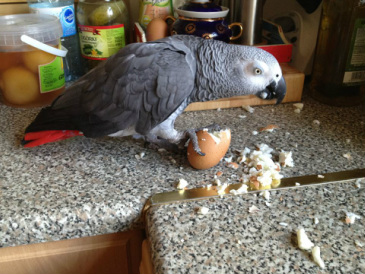
Coco By Marta Junko, Ireland
Eggs, including eggshells, are a wonderful source of nutrition for pet birds. In the wild many bird species will consume unhatched eggs and eggshells as they are a vital source of protien, calcium, and minerals. It is completely natural for a bird to eat eggs, and although it may seem strange to us humans, our avian friends suffer absolutely no psychological problems as a result of it.
You can serve eggs to your bird in a variety of ways, but it's important to keep healthy preperation in mind. The healthiest way to cook eggs for your bird is to hard-boil them and then cut them up (along with the shells) into bite-sized pieces. You can also scramble the eggs but make sure to hold the salt and any other "human" seasonings!
Always make sure that the eggs you serve your bird have cooled to room temperature, to avoid burning your pet. Remove any uneaten egg food from your bird's cage after two hours, to prohibit the growth of nasty bacteria.
You can serve eggs to your bird in a variety of ways, but it's important to keep healthy preperation in mind. The healthiest way to cook eggs for your bird is to hard-boil them and then cut them up (along with the shells) into bite-sized pieces. You can also scramble the eggs but make sure to hold the salt and any other "human" seasonings!
Always make sure that the eggs you serve your bird have cooled to room temperature, to avoid burning your pet. Remove any uneaten egg food from your bird's cage after two hours, to prohibit the growth of nasty bacteria.
SUGAR CANE
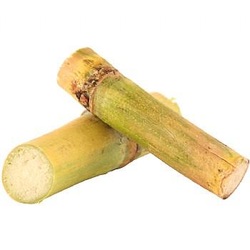
Sugar Cane is a nutritious natural treat suitable for all Parrots. Full of natural vitamins and minerals, your Parrot will have great fun chewing it to pieces. Only allow sugar cane as an occassional treat though as too much sugar can be harmful.
PASTA AND RICE
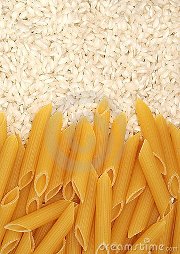
Pasta, cooked grains and legumes:
Enriched, whole wheat or veggie pasta, brown rice, cooked barley, millet or quinoa are great examples of nutritious foods that most any parrot will enjoy. When cooked and served warm it’s a wonderful winter treat. My favorite thing about these foods is that it is so easy to slip in an untried veggie. Since I know that they are going to go for the warm brown rice, I mash up a little squash, or add a little chopped spinach into the rice of those birds who might be reluctant to try it otherwise.
Enriched, whole wheat or veggie pasta, brown rice, cooked barley, millet or quinoa are great examples of nutritious foods that most any parrot will enjoy. When cooked and served warm it’s a wonderful winter treat. My favorite thing about these foods is that it is so easy to slip in an untried veggie. Since I know that they are going to go for the warm brown rice, I mash up a little squash, or add a little chopped spinach into the rice of those birds who might be reluctant to try it otherwise.
CAYENNE FOR PARROTS
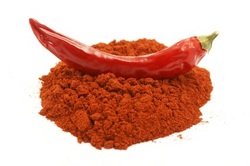
CAYENNE is also known as capsicum. It is an overall digestive aid containing Vitamins A, C, B-complex, calcium, phosphorous and iron. It is also anti-inflammatory and helps arthritic conditions. Parrots love the fiery taste of cayenne and will try new and unfamiliar foods, such as sprouts, when you sprinkle this healthful herb on their food.
